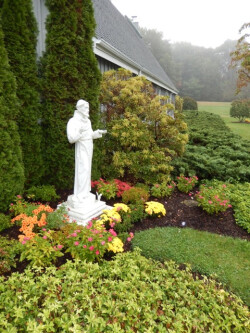St. Francis of Assisi
The beauty of creation, and our part in it, is a continuously unfolding miracle.
 Today we honor the life and work of St. Francis of Assisi. Francis was born in 1182, and was the son of prosperous merchant. But later in life, he was moved by the beggars and lepers he saw and decided to devote his life to a life of poverty – despite his father’s intense opposition. Francis gathered a community together – although his ideal of strict and absolute poverty was so stark that almost no one could maintain the ideal. But what Francis was trying to get the brothers to see was that “stuff” got in the way of life with Christ. Once he renounced his “stuff” he was better able to see – see his neighbors’ poverty and suffering. And giving up his “stuff” allowed Francis to take in a bigger view of God’s creation. Though we sometimes narrow in on Francis’ love of animals, St. Francis had a much larger sense of the creative God and God’s created world. Francis reveled in the creator God, who time and again during the creation process saw that, “it was good.”
Today we honor the life and work of St. Francis of Assisi. Francis was born in 1182, and was the son of prosperous merchant. But later in life, he was moved by the beggars and lepers he saw and decided to devote his life to a life of poverty – despite his father’s intense opposition. Francis gathered a community together – although his ideal of strict and absolute poverty was so stark that almost no one could maintain the ideal. But what Francis was trying to get the brothers to see was that “stuff” got in the way of life with Christ. Once he renounced his “stuff” he was better able to see – see his neighbors’ poverty and suffering. And giving up his “stuff” allowed Francis to take in a bigger view of God’s creation. Though we sometimes narrow in on Francis’ love of animals, St. Francis had a much larger sense of the creative God and God’s created world. Francis reveled in the creator God, who time and again during the creation process saw that, “it was good.”
Our Sunday School children have been working on the creation story this Fall. They are learning about the vast expanse of interstellar space, as well as this fragile earth, our island home. They are learning about how God created plants and every living creature. They are also learning about how we are created in God’s image and we are to be stewards of God’s creation. They are learning how we are designed for goodness and generosity, and that all of life is a gift – that we do not own any of it. St. Francis knew this well. His understanding of life as a gift is why he could give up everything.
But we struggle – we clutch our resources and we use words like “earned,” and “deserve” and forget words like “gift” and “generosity.” St. Francis’ life is all well and good, but when we really look at our resources, we more often find our hands clenched around our possessions than our hands openly giving them away. I invite us to ponder this contrast not to make us feel guilty, but to invite us to live into God’s generosity. That is what St. Francis wanted too. He did not want to guilt people, but to welcome people into the freedom of knowing that all we have is gift, and to live a life in celebration of that gift. Francis had experienced this radical way of living into the people God calls us to be, and he wanted to share that blessing with others.
Our Gospel lesson today gives us some clues about what all this means in practice. Jesus says, “Come to me, all you that are weary and are carrying heavy burdens, and I will give you rest. Take my yoke upon you, and learn from me; for I am gentle and humble in heart, and you will find rest for your souls. For my yoke is easy, and my burden is light.” Those words from Jesus are echoed in St. Francis’ life and witness. We may not be able to walk around shoeless in the depths of winter like Francis, or even beg for our food, but when we enter into relationship with God with a greater sense of God’s invitation into the life of generosity, we can image and experience the light yoke. This is the reflection work we will be doing throughout our stewardship season this fall – but Francis and Jesus give us a little preview about what stewardship really looks like. So take a moment to start today. Take in the beautiful creation of our property, as its Fall glory begins to unfold. If you are an animal lover, look at the generous love of your pet. Look at one another, remembering the vulnerable beauty of each person here – even those who annoy you the most. Let this wonder and gratitude fill you up – so that you can slip on that light yoke of generosity and live into the goodness that God has created for you and has created you for. Amen.

